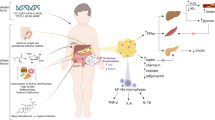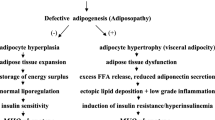Abstract
Background
An imbalance of inflammatory factors can stimulate obesity by inducing chronic inflammation in adipose tissue. Interleukin-6 (IL-6) is a cytokine with both inflammatory and anti-inflammatory functions. Suppressor of cytokine signaling 3 (SOCS3) acts as an inhibitor for a number of cytokine signals. The IL-6 and SOCS3 genes are known to be involved in lipid and energy metabolism, although it is unclear how these genes relate to obesity. The aim of this study is to determine whether the obesity risk is associated with the IL-6 (rs1800795, rs1800796) and SOCS3 (rs4969170) gene polymorphisms.
Methods and results
Based on their body mass index (BMI) scores, 185 people were determined, of whom 90 were from the control group and 95 were obese. Anthropometric measurements and biochemical parameters of the study subjects were documented during the examination. Genomic DNA isolation was performed from the blood samples of all participants. IL-6 (rs1800795, rs1800796) and SOCS3 (rs4969170) polymorphisms were detected by real-time quantitative polymerase chain reaction (qRT-PCR) from genomic DNA samples. The IL-6 rs1800795 and rs1800796 variants showed a significant difference between the control and obese groups (p = 0.027; p = 0.013). The SOCS3 rs4969170 variation did not substantially differ between the control and obese groups (p = 0.825).
Conclusion
In our study, IL-6 rs1800795(G/C) and rs1800796(G/C) polymorphisms appeared to be a risk factor for obesity. The C allele was associated with the obesity phenotypes. However, the SOCS3 rs4969170 (A/G) polymorphism was not linked to an increased risk of obesity. IL-6 polymorphisms may be new targets for obesity treatment.
Similar content being viewed by others
References
Pigeyre M, Saqlain M, Turcotte M, Raja GK, Meyre D (2018) Obesity genetics: insights from the pakistani population. Obes Rev 19:364–380
Lumeng CN, Saltiel AR (2011) Inflammatory links between obesity and metabolic disease. J Clin Investig 121(6):2111–2117
Mauer J, Chaurasia B, Goldau J, Vogt MC, Ruud J, Nguyen KD, Theurich S, Hausen AC, Schmitz J, Brönneke HS, Estevez E, Allen TL, Mesaros A, Partridge L, Febbraio MA, Chawla A, Wunderlich FT, Brüning JC (2014) Signaling by IL-6 promotes alternative activation of macrophages to limit endotoxemia and obesity-associated resistance to insulin. Nat Immunol 15:423–430
Bastard JP, Maachi M, Lagathu C, Kim MJ, Caron M, Vidal H, Capeau J, Feve B (2006) Recent advances in the relationship between obesity, inflammation, and insulin resistance. Eur Cytokine Netw 17(1):4–12
Illán-Gómez F, Gonzálvez-Ortega M, Orea-Soler I, Alcaraz-Tafalla MS, Aragón-Alonso A, Pascual-Díaz M, Pérez-Paredes M, Lozano-Almela ML (2012) Obesity and inflammation: change in adiponectin, C-reactive protein, tumour necrosis factor-alpha and interleukin-6 after bariatric surgery. Obes Surg 22:950–955
Speakman JR (2013) Functional analysis of seven genes linked to body mass index and adiposity by genome-wide association studies: a review. Hum Hered 75:57–79
Valladares M, Obregon AM, Chaput JP (2015) Association between genetic variants of the clock gene and obesity and sleep duration. J Physiol Biochem 71:855–860
Ronti T, Lupattelli G, Mannarino E (2006) The endocrine function of adipose tissue: an update. Clin Endocrinol 64:355–365
Joffe YT, Collins M, Goedecke JH (2013) The relationship between dietary fatty acids and inflammatory genes on the obese phenotype and serum lipids. Nutrients 5:1672–1705
Popko K, Gorska E, Demkow U (2010) Influence of interleukin-6 and G174C polymorphism in IL-6 gene on obesity and energy balance. Eur JMed Res 15(suppl 2):123–127
De Filippo G, Rendina D, Moccia F, Rocco V, Campanozzi A (2015) Interleukin-6, soluble interleukin-6 receptor/interleukin-6 complex and insulin resistance in obese children and adolescents. J Endocrinol Investig 38(3):339–343
Larder R, Lim CT, Coll AP (2014) Genetic aspects of human obesity. Handb Clin Neurol 124:93106
Bienertova-Vasku J, Bienert P, Tomandl J, Forejt M, Vavrina M, Kudelkova J, Vasku A (2008) No association of defined variability in leptin, leptin receptor, adiponectin, proopiomelanocortin and ghrelin gene with food preferences in the czech population. Nutr Neurosci 11:2–8
Boeta-Lopez K, Duran J, Elizondo D, Gonzales E, Rentfro A, Schwarzbach AE, Nair S (2017) Association of interleukin-6 polymorphisms with obesity or metabolic traits in young Mexican-Americans. Obes Sci Pract 4(1):85–96
Wunderlich CM, Hövelmeyer N, Wunderlich FT (2013) Mechanisms of chronic JAK-STAT3-SOCS3 signaling in obesity. JAKSTAT 2(2):e23878
Pedroso JAB, Ramos-Lobo AM, Donato J Jr (2019) SOCS3 as a future target to treat metabolic disorders. Hormones 18(2):127–136
Li P, Tiwari HK, Lin WY, Allison DB, Chung WK, Leibel RL, Yi N, Liu N (2014) Genetic association analysis of 30 genes related to obesity in a european american population. Int J Obes 38(5):724–729
https://www.who.int/europe/news-room/fact-sheets/item/a-healthy-lifestyle---who-recommendations. Accessed 20 Aug 2020
Ouchi N, Parker JL, Lugus JJ, Walsh K (2011) Adipokines in inflammation and metabolic disease. Nat Rev Immunol 11:85–97
Williams JJ, Munro KM, Palmer TM (2014) Role of ubiquitylation in controlling suppressor of cytokine signalling 3 (SOCS3) function and expression. Cells 3:546–562
Tang W, Zou JJ, Chen XF, Zheng JY, Zeng HZ, Liu ZM, Shi YQ (2011) Association of two polymorphisms within and near SOCS3 gene with obesity in three nationalities in Xinjiang province of China. Acta Pharmacol Sin 2(11):1381–1386
Gholami M, Sharifi F, Shahriari S, Khoshnevisan K, Larijani B, Amoli MM (2019) Association of interleukin-6 polymorphisms with obesity: a systematic review and meta-analysis. Cytokine 123:154769
Hu M, Yu Z, Luo D, Zhang H, Li J, Liang F, Chen R (2018) Association between – 174G > C polymorphism in the IL-6 promoter region and the risk of obesity: a meta-analysis. Medicine 97(33):e11773
Kubaszek A, Pihlajamäki J, Komarovski V, Lindi V, Lindström J, Eriksson J, Valle TT, Hämäläinen H, Ilanne-Parikka P, Keinänen-Kiukaanniemi S, Tuomilehto J, Uusitupa M, Laakso M (2003) Finnish diabetes prevention study. Promoter polymorphisms of the TNF-alpha (G-308A) and IL-6 (C-174G) genes predict the conversion from impaired glucose tolerance to type 2 diabetes: the Finnish diabetes prevention study. Diabetes 52(7):1872–1876
Ibrahim OM, Gabre AA, Sallam SF, El-Alameey IR, Sabry RN, Galal EM, Tawfik SM, Zarouk WA, Mosaad RM, Ramadan A (2017) Influence of Interleukin-6 (174G/C) gene polymorphism on obesity in egyptian children. Open Access Maced J Med Sci 5(7):831–835
Lang Lehrskov L, Lyngbaek MP, Soederlund L, Legaard GE, Ehses JA, Heywood SE, Wewer Albrechtsen NJ, Holst JJ, Karstoft K, Pedersen BK, Ellingsgaard H (2018) Interleukin-6 delays gastric emptying in humans with direct effects on glycemic control. Cell Metab 27(6):1201-1211e3
Timper K, Denson JL, Steculorum SM, Heilinger C, Engström-Ruud L, Wunderlich CM, Rose-John S, Wunderlich FT, Brüning JC (2017) IL-6 improves energy and glucose homeostasis in obesity via enhanced Central IL-6 trans-signaling. Cell Rep 19(2):267–280
Sadagurski M, Norquay L, Farhang J, D’Aquino K, Copps K, White MF (2010) Human IL6 enhances leptin action in mice. Diabetologia 53(3):525–535
Javalera D, Quintero-Ramos A, Medina-Mora Y, Del Toro-Arreola A, Franco-Topete RA, Oceguera-Villanueva A, Barragán-Ruiz A, Flores-Márquez MR, Topete A, Daneri-Navarro A (2020) The – 174G > C and – 596G > A polymorphisms are not Associated with circulating IL-6 levels in breast cancer patients from Jalisco, México. Genet Test Mol Biomark 24(4):224–228
Zhang J, Li N, Yao X, Zhou L, Zhang J, Lin N, Hong J (2014) Association of SOCS3 gene polymorphisms with insulin resistance in Xinjiang Uygur population. Chin J Med Genet 31(2):201–205
Acknowledgements
Thanks is due to Gizem Koprulu Kucuk for skilled technical assistance.
Funding
This research was supported by a Grant from the Research Foundation of Istanbul Aydin University, Turkey (Project No: 2021/8 18635).
Author information
Authors and Affiliations
Corresponding author
Ethics declarations
Conflict of interest
The authors declare that they have no confct of interest.
Ethical approval
All procedures performed in this study involving human participants were in accordance with the ethical standards of the institutional and/or national research committee and with the 1964 Helsinki Declaration and its later amendments or comparable ethical standards. Ethical approval was obtained from the local ethics committee (Istanbul Aydin University Ethical Committee (Ethic No: B.30.2.AYD.0.00.00-050.06.04/398). All subjects agreed to participate in this study and signed the informed consent form prior to the study.
Additional information
Publisher’s Note
Springer Nature remains neutral with regard to jurisdictional claims in published maps and institutional affiliations.
Rights and permissions
Springer Nature or its licensor (e.g. a society or other partner) holds exclusive rights to this article under a publishing agreement with the author(s) or other rightsholder(s); author self-archiving of the accepted manuscript version of this article is solely governed by the terms of such publishing agreement and applicable law.
About this article
Cite this article
Koc, G., Doran, T., Uygur, M.M. et al. Obesity is associated with IL-6 gene polymorphisms rs1800795 and rs1800796 but not SOCS3 rs4969170. Mol Biol Rep 50, 2041–2048 (2023). https://doi.org/10.1007/s11033-022-08129-y
Received:
Accepted:
Published:
Issue Date:
DOI: https://doi.org/10.1007/s11033-022-08129-y




